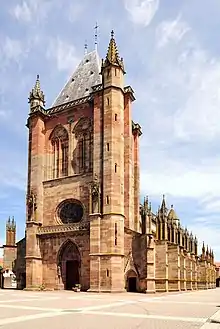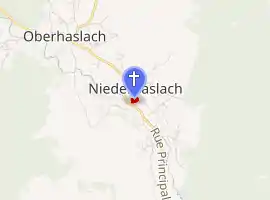Niederhaslach Church
The Roman Catholic[1] Parish church Saint John the Baptist (French: Église paroissiale Saint-Jean Baptiste), formerly Collegiate church Saint Florentius (Collégiale Saint-Florent) is the main church of the small city of Niederhaslach in Alsace. The building is widely considered one of the finest and most ornate examples of Gothic architecture and Gothic art in the Bas-Rhin departement of France.[2]
| Niederhaslach Church | |
|---|---|
| Église paroissiale Saint-Jean Baptiste Collégiale Saint-Florent | |
 | |

| |
| Location | Niederhaslach |
| Country | France |
| Denomination | Roman Catholic Church |
| History | |
| Founded | 1274 |
| Architecture | |
| Heritage designation | Monument historique |
| Designated | 1846 |
| Architect(s) | Gerlach von Steinbach |
| Style | Gothic architecture |
| Completed | 1385 |
| Specifications | |
| Length | 51.1 m (168 ft) |
| Height | 42 m (138 ft) |
| Administration | |
| Archdiocese | Strasbourg |
History
The church, which was originally dedicated to Florentius of Strasbourg, bishop of Strasbourg from 618–624, was built from 1274 on as a replacement for a building from the 7th century that had been the shrine since 810 (by order of bishop Ratho) of relics of the Saint.[3] The new church was under construction until 1385: a fire on 4 June 1287 that destroyed everything but the choir as well as the accidental death of the architect Gerlach von Steinbach (the son of Erwin von Steinbach) in 1330 had slowed down its completion. The church was plundered during the German Peasants' War in 1525 and on 6 June 1633, it was burned by Swedish mercenaries during the Thirty Years' War.[3] The building was neglected during the following two centuries and even served as a slaughterhouse in 1744.[3] The French Revolution, however, spared the church, but dissolved the chapter to which it belonged.[4] The church was thoroughly restored from 1853 to 1887 by architects Émile Boeswillwald[5] and Charles Winkler, and again from 1990 to 2006.[6]
Niederhaslach's church is listed as a Monument historique since 1846 by the French Ministry of Culture.[7]
Furnishing
Stained glass windows
Niederhaslach's church prides itself with one of the most complete and well preserved/restored collections of medieval stained glass windows in Alsace after Strasbourg Cathedral.[2] The nave and choir display a large number of windows from the 13th and 14th century, remarkable for their shining nuances of blue and red and the number and variety of represented human figures. They represent the life of Jesus and Mary as well as of John the Baptist. The most famous window, being the most original in its design, is the one showing the predication of John the Baptist, the central figure being displayed life-sized.[8] The façade shows a rose window of the year 1325.[3]
Sculptures
Outside
- Grand portal of 1310 representing the Annunciation, the Coronation of Mary and the Legend of Saint Florentius
- Numerous gargoyles all around the building in the shape of humans and beasts
- Remains of the cemetery: tombstones of clerical people from the 14th to the 18th century
- Bas-relief "Christ on the Mount of Olives" (1492).
Inside
Pipe organ
On the inside of the façade is a pipe organ from 1903.[9]
Gallery
 Lateral view
Lateral view Tympanum of the main portal
Tympanum of the main portal The nave looking towards the choir
The nave looking towards the choir Entombement of Christ
Entombement of Christ.jpg.webp) Stained glass window "Virtues fighting vices"
Stained glass window "Virtues fighting vices" Relief "Christ on the Mount of Olives"
Relief "Christ on the Mount of Olives" Choir stalls
Choir stalls Pulpit
Pulpit
 Sacristy (14th century)
Sacristy (14th century)
Dimensions
The known dimensions are as follows[3]
- Height of spire: 42 metres (138 feet)
- Length of central nave: 26.25 metres (86.1 feet)
- Total length: 51.1 metres (168 feet)
Sources and references
- Niederhaslach – Église catholique Saint-Jean Baptiste (in French)
- HB Kunstführer Straßburg - Colmar - Elsaß, 1986, ISBN 3-616-06520-8 (in German)
- Niederhaslach, sa collégiale, anonymous publication (Authors: "J.S. - P.M.") of the Association des Amis de Saint-Florent, 3rd trimester 1994. (in French)
- Niederhaslach Archived 2010-04-13 at the Wayback Machine (in French)
- Emile Boeswillwald (1815-1896) (in French)
- La nef remise à neuf, Les Dernières Nouvelles d'Alsace, 3 March 2006 (in French)
- (in French) French Ministry of Culture database entry
- A view of the window
- The Rinkenbach pipe organ Archived 2016-03-03 at the Wayback Machine (in French)
External links
![]() Media related to Collégiale Saint-Florent de Niederhaslach at Wikimedia Commons
Media related to Collégiale Saint-Florent de Niederhaslach at Wikimedia Commons